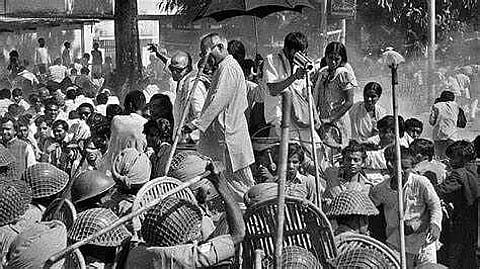
- Home
- Live Blog
- Breaking News
- Top Headlines
- Cities
- NE News
- Sentinel Media
- Sports
- Education
- Jobs

OUR CORRESPONDENT
ITANAGAR: The Arunachal Pradesh unit of the BJP observed 'Black Day on Sunday at the party's headquarters, along with at district and mandal level, to mark the 48 years of emergency imposed across the country in 1975 by the Congress government led by Prime Minister Indira Gandhi. Speaking on the occasion, the party's spokesperson, Techi Necha, said that the emergency was one of the most controversial periods of Indian history since its independence. The final decision to impose an emergency was proposed by Indira Gandhi, agreed upon by the President of India, and ratified by the Cabinet and Parliament from July to August 1975. Necha alleged that during the period, power was concentrated within the Prime Minister's Secretariat rather than the cabinet. "Gandhi ruthlessly outmanoeuvred her rivals and split the Congress party in 1969 into the Congress (O), composed of the old guard known as the syndicate, and her Congress (R). A majority of the All India Congress Committee and Congress MPs sided with Gandhi's party, Congress (R)," he said.
He added that Gandhi's party was a different breed from the old Congress, and the members of her party quickly realized that their progress within the ranks depended on their loyalty to Gandhi and her family. "Thus, the sycophancy became the routine in the party, installing a hand-picked loyalist as Chief Minister of States without being elected by the Congress Legislature Party. Among others, nationalization of several major banks, abolition of privy purses, the slogan "Garibi Hatao" securing an absolute majority in the general election of 1971, and interfering in the judiciary matter by the 24th Constitutional Amendment and the 26th Constitutional Amendment of 1971 were some of the developments," he added. Necha said that there was political unrest in the country, which forced a few Congress leaders to demand a presidential emergency declaration with a more powerful directly elected executive. Necha pointed out that during the Navnirman Moment in Gujarat during 1973 and 1974, student unrest against the state education minister forced the Centre to dissolve the state legislatures, resulting in the resignation of Chief Minister Chiman Bhai Patel and finally the imposition of President Rules.
Student agitation by the Bihar Chatra Sangharsh Samiti, supported by Gandhian socialist Jaya Prakash Narayan's (JP) movement against the Bihar government for total revolution, and a nationwide railways strike led by the Firebrand trade union leader George Fernandes followed suit. "There was massive political opposition, desertion, and disorder across the country against her party. Gandhi stuck to the advice of a few loyalists, her younger son Sanjay Gandhi, and the then West Bengal Chief Minister Siddhartha Sankar Ray to impose an internal emergency," he added. The party's state secretary, Tiring Tiri, condemned the emergency of 1975, describing it as the darkest history of Indian Parliamentary democracy. The party's ST Morcha state president, Hinium Tachu, media department co-convenor Nima Sange, and others also attended the programme, a party release informed here today.
Also Read: Emergency 1975: For Millennials
Also Watch: